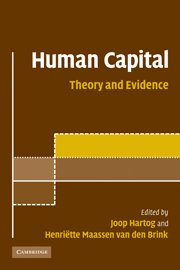Book contents
- Frontmatter
- Contents
- List of figures
- List of tables
- Notes on contributors
- Prologue
- Part I Measuring the benefits from human capital
- Part II Applying and extending the human capital model
- Part III Policy interventions
- 10 Using (quasi-)experiments to evaluate education interventions
- 11 Unemployment duration: policies to prevent human capital depreciation
- 12 Can We stimulate teachers to enhance quality?
- 13 Optimal tax and education policies and investments in human capital
- Epilogue: some reflections on educational policies
- A note on econometrics
- Index
- References
12 - Can We stimulate teachers to enhance quality?
Published online by Cambridge University Press: 22 September 2009
- Frontmatter
- Contents
- List of figures
- List of tables
- Notes on contributors
- Prologue
- Part I Measuring the benefits from human capital
- Part II Applying and extending the human capital model
- Part III Policy interventions
- 10 Using (quasi-)experiments to evaluate education interventions
- 11 Unemployment duration: policies to prevent human capital depreciation
- 12 Can We stimulate teachers to enhance quality?
- 13 Optimal tax and education policies and investments in human capital
- Epilogue: some reflections on educational policies
- A note on econometrics
- Index
- References
Summary
Introduction
Teachers are the backbone of schools, and the inputs in the production of human capital. It is therefore no surprise that parents, school boards and policy-makers have a strong interest in the availability and the quality of teachers. In this chapter we consider compensation as a policy instrument to influence the volume and the quality of teacher supply.
Often, compensation of teachers at a given rank is mainly determined by tenure. Furthermore, the risk of being laid off declines with tenure. One may wonder whether such incentives effectively contribute to the supply, quality and motivation of teachers. Many other incentive schemes are conceivable, which are put into practice not only in the private sector but also in the public education sector in some countries.
What kinds of pay criteria are possible and what kinds of effects do they generate? The following pay criteria are discussed: fixed pay, performance-related pay, relative compensation, team compensation, and work–life incentives. The empirical literature regarding the use of these different payment schemes for teachers is also discussed.
A review of the literature makes clear that teachers are sensitive to incentives. At the same time it shows that education is a complex organization, where strong, explicit incentives could do more harm than weak, implicit incentives. This may also explain the lack of powerful incentives in most existing arrangements and the failure of most merit pay experiments. On the other hand there seems to be room for improvement.
- Type
- Chapter
- Information
- Human CapitalAdvances in Theory and Evidence, pp. 189 - 211Publisher: Cambridge University PressPrint publication year: 2007



